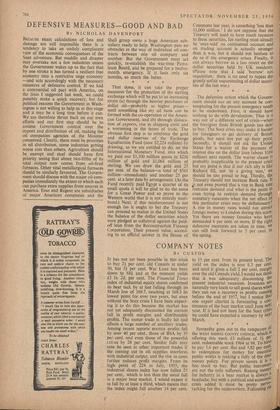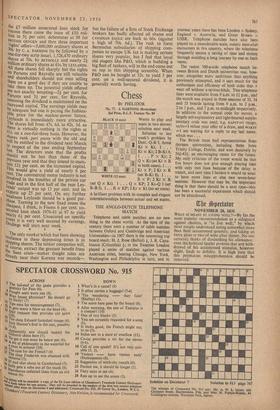COMPANY NOTES
BY CUSTOS IT has not yet been possible in this crisis to buy 24 per cent. old Consols at under 50, but 34 per cent. War Loan has been down to 68} and at the moment yields £5 Is. 2d. per cent. The Financial Times index of industrial equity shares confirmed its bear tack by at last falling through its March low of 169.7, reaching at 168.3 its lowest point for over two years, but even without the Suez crisis I have been expect- ing it to do this because the market has not yet adequately discounted the current fall in profit margins and distributable profits. The motor trade is badly hit and affects a large number of ancillary trades. Among recent reports ROOTES profits fell by over 40 per cent., those of BSA by 35 per cent. and even those of the powerful LUCAS by 28 per cent. Similar falls may now be seen in other important trades if the coming cut in oil supplies interferes with industrial output, and the rise in costs further reduces profit margins. From its high point of 224 in July, 1955, the industrial shares index has now fallen 25 per cent., which is less than the usual fall in a major bear market. I would expect it to fall by at least a third, which means that the index might fall another 14 per cent. to 15 per cent. from its present level. The yield on the index is now 6.3 per cent• and until it gives a full 2 per cent. margin over the old Consols yield, I would not thin!' that it was adequately discounting the present industrial recession. Investors are naturally very loath to sell good shares when they can see a recovery in profits coming before the end of 1957, but I notice that one expert chartist is forecasting a con- tinuance of the bear market until June ilet year. If it had not been for the Suez crisis we could have expected a recovery by next March.
Sympathy goes out to the ratepayers of the WEST RIDING COUNTY COUNCIL which 15 offering this week £3 million of 54 per cent. redeemable stock 1964 at 98. To have to pay 5.6 per cent. flat and 5.82 per cet.tt; to redemption for money for essentan public works is making a folly of the deaf „ money policy. For private savers it is -; fine stock to buy. But public borrowers are not the only sufferers. Raising money for industry in a bear market is always .11 headache, but with a political and economic crisis added it must be pretty nerve- racking for the underwriters. Following on the £5 million unsecured loan stock for FIsoNs there came the issue of i10 mil- lion in 51 per cent. debentures at 98 for itrrIsx OXYGEN and then three important rights' offers-3,600,000 ordinary shares at 30s, by c. A. PARSONS (to be followed by a one-for-two scrip issue), 1,526,470 ordinary shares at 70s. by REYROLLE and nearly 21 Million ordinary shares at 41s. by LEYLANDS. All these shares fell sharply but the rights on Parsons and Reyrolle are still valuable and shareholders should not miss selling them on a good day if they are unable to take them up. The potential yields offered are not exactly tempting-2i per cent. for Parsons and 31 per cent. for Reyrolle, assuming the dividend is maintained on the Increased capital. The earnings yields may be adequate but one is paying the fashion- able price for the nuclear-power future. Leylands is immediately more attractive. 1 he shares fell from 47s. 6d. to 42s. 3d. so there is virtually nothing in the rights at 41s. on a one-for-three basis. However, the shares rank pall passe with the old and Will be entitled to the dividend next March !II respect of the year ending September last. The directors state that the profits should not be less than those of the Previous year and that they intend to main- tain 121 per cent. on the increased capital. This would give a yield of nearly 6 per sent. The commercial motor industry is not involved in the troubles of the private car trade and in the first half of the year Ley- lands. output was up 13 per cent. and its "Ports up 25 per cent. On any further weakness Leylands should be a good pur- chase. Turning to the new fixed issues the cheapest, I think, is Fisons 6 per cent. un- secured loan stock 1976-81 at 97 to yield ?early 61 per cent. Unsecured on specific ,,i,ssets it is very well secured by earnings. Dealings will start next week.
*
The only market which hag been showing resilience in these depressing times is in shiPping shares. The tanker companies will, of course, extract the greatest benefit from rSuez crisis-tanker freight rates are eady near their Korean war records- but the failure of a firm of Stock Exchange brokers has badly affected oil shares and CANADIAN EAGLE are back to 66s. (against a high of 70s. 6d.). The rush to form Bermudan subsidiaries of shipping com- panies to escape UK tax is making certain shares very popular, but I feel that loyal old stagers like P&O, which is building a big fleet of tankers, will in the end come out' on top in this shipping scramble. When P&O can be bought at 32s. to yield 5 per cent. on a well-secured dividend, it is generally worth having.











































































 Previous page
Previous page